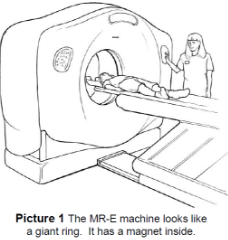Magnetic Resonance Enterography (MR-E)
![]()
Magnetic Resonance Enterography (mag NET ick REZ oh nance en ter OGG raf fee) is a test that lets the doctor see what is happening inside the body. It can simply be called an MR-E.
It takes pictures of the gastrointestinal (gas tro in TEST in ul) or GI tract, which is the stomach and intestines. This test uses magnets and radio waves instead of using X-rays to record the pictures of your child’s GI tract on a computer.
Tell your child about this test at a time you believe is best, and in a way that your child can understand. This test (including both prep time and the scan) takes about 2 ½ to 3 ½ hours after you arrive.
Before the MR-E
- Your child should have nothing to eat or drink for 4 hours before the arrival time.
- Gum, cough drops and any candy, including hard candy, are not allowed.
- Tell your child’s doctor if your child has any allergies.
- Your child should wear loose-fitting clothes with no metal. Choose pants with a stretchy waistband (with no zipper or snap).
During the Prep Time
- Before the test, we will give your child a clear liquid oral prep (Breeza®, Volumen® or Miralax®) to drink.
- The oral prep that your child drinks is very important. It helps us see the bowel (intestine) lining more clearly during the test.
- The amount of liquid will depend on your child’s weight, but it could be up to 1.5 liters (about six cups). This will be divided into 3 doses. We will ask your child to try to drink each dose slowly over 20 minutes by taking small sips.
- Your child will be asked to walk between each dose of oral prep to aid the movement of the oral prep from the stomach into the bowel.
- If your child is not able to drink the liquid, we can give it through a tube that goes through the nose, down the throat, and into the stomach.
- Your child will be given some medicine through a vein (blood vessel). This medicine helps the intestines show up on the pictures. Before putting the needle into the vein (called an IV) to start giving the medicine, the nurse will put a numbing cream on your child’s skin to keep it from hurting.
- Your child will also be given a shot during the scan to help slow down the movement of the intestines. The nurse will put a numbing cream on this spot before giving the shot, too.
- Once this prep is done, the scan can start.
During the Scan
- Your child will not have any pain from this test.
- The scan will take about 30 to 40 minutes.
- One (1) parent may stay in the MRI room with the child during the test.
- If you would like to stay with your child during the test, please tell the technologist.

- If you plan to stay in the MRI room, you will need to wear clothes with no metal, remove your jewelry, and leave all items with metal outside the MRI room.
- Your child will lie on his or her back, on a padded table.
- We will give your child earplugs to wear during the scan. There will be loud tapping or hammering sounds.
- The technologist will move the table so that your child’s body is inside the opening of the magnet (Picture 1).
- It is important for your child to be very still during the test.
- The technologist will be outside the room during the test, but will be able to see and talk to your child.
- There will be times during this test when your child will be told to hold his or her breath so the computer can get a better picture.
- When the test is over, the nurse will remove the IV.
After the MR-E
- Your child may go back to eating as usual.
- Your child may go back to normal activities.
- Your child may have some loose stools or diarrhea the afternoon or evening after the scan, and maybe the next day.
Results and Follow-Up
It takes about 1 week for the test results to be ready. When the report is ready, your child’s doctor will explain what the test showed, and tell you the plan for your child’s medical care.
HH-III-130 10/14, Revised 6/16 Copyright 2014 Nationwide Children's Hospital
